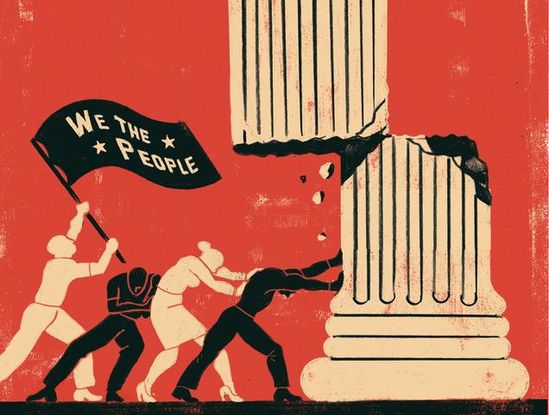We are entering the election year. We are entering the most vulnerable phase of our democracy. The most exposed and susceptible point of a democracy is during its elections. It is the time where money and power do their dirtiest jobs. It is the time when people, even MLAs and MPs are not spared, are bought and sold like slaves; and people allow themselves to be sold and bought like pigeons in the market. A country or an organisation becomes vulnerable during elections because it could become an exercise of demonstration of mindless tyranny of the majority.
In Democracy Power Is a Fundamental Right
There are many forms of governments, but only in modern democracy people hold power as a fundamental right. In every other form of government the ruled are at the mercy of the rulers. Monarchies are absolute; a republic is authoritarian with power in the hands of a few; in oligarchy power is held by a small group of powerful and wealthy people, often they are hidden from the people; a dictator has no limits to his power; he rules though force and fraud; in theocracy force and fraud are disguised and veiled in the holy name of god.
People devoid of ordinary powers make up a system that is bound to fail. Power gives people voice; and it is essential for a free and just society. Masses with power hold leaders accountable; if the leaders do not perform well, they can be voted out of office. When people have a say in who governs them, they are less likely to resort to violence to express their dissatisfaction. They encourage civic engagement and participation in the political process. Democratic elections help to promote diversity and tolerance in a country. People should not be afraid of their governments. Governments should be afraid of their people, says, Alan Moore.
Free and Fair Elections
Elections are the quintessential possibility of a democracy. Elections are opportunities to clean up. Every five years we have an opportunity to clean up the filth. That is why the ruling party or leaders fear elections. Erdogan of Turkey has changed the constitution to expand his powers, and has cracked down on dissent. Xi Jinping of China has abolished term limits for the president. This has led to concerns that Xi may be planning to rule China for life. Vladimir Putin of Russia has changed the constitution twice to allow him to stay in power longer. Alexander Lukashenko of Belarus has been accused of rigging elections and suppressing dissent. He has refused to step down. The list could go on.
Thank God India still has leaders who respect the verdict of the elections. Though most institutions of the country that ensure free and fair elections, like the election commission, judiciary, media, etc. are already tampered with. In a democracy with elections in place people still have the power to clean up the filth. For India, General Elections 2024 is Swachh Bharat 2024.
Developing Political Consciousness
Democracies decay when its people become apolitical and naively get attracted to strong leaders than democratic leaders. Voting is to make sure that everyone is included and has equal rights. Democracy is not rule by strength, and not even by mere numbers, but by a system where everyone is included; and everyone has the possibility to be heard and has the capacity to live their lives.
Apoliticism is apathy or antipathy towards all political affairs and affiliations. They have no interest and remain uninvolved at the face of even the severest matters of concern. Some even have an aversion to politics or political affairs; and parade it as a spiritual value. Both Political leaders as well as the voters can go apolitical. Political party leaders become apolitical when they move along with large corporations, to achieve their profit goals; that reduces a democracy to commerce or business model in which groups, parties and even companies invest to make profit. General public becomes apolitical when their voting is based on non-critical factors that do not support the wellbeing of all peoples: such as the distribution of resources or status. Perhaps the success of Indian erred democracy is that it managed to make a large majority of Indians apolitical. When people become apolitical, democracy gets reduced to just majoritarianism. What does not concern the majority will not concern the nation and the government.
People Will Reject Violence
Party politics has become an unethical battlefield, thriving on intolerance, corruption, and violence. None of them will stand the test of time in an advanced, civilised society.
Politicians must give up intolerance and violence; embrace understanding, empathy, and kindness. People must reject those politicians who refuse to promote peace and tolerance. When someone’s path to the top is marked with cruelty, they have failed the first test of an advanced society, said J B Pritzker, an American philanthropist and 43rd governor of Illinois. When we see someone who does not look like us, sound like us, act like us, love like us, or live like us, the first thought that crosses our mind is rooted in fear or judgement, or both. That is part of evolution. We survived as a species by being suspicious of things that we are not familiar with. In order to be kind we have to shut down that animal instinct and force our brain to travel a different path. Empathy and compassion are evolved states of being. They require the mental capacity to step past our most primal forces. Empathy and kindness too are political.
Written as TOGETHER editorial.

Comments
Post a Comment